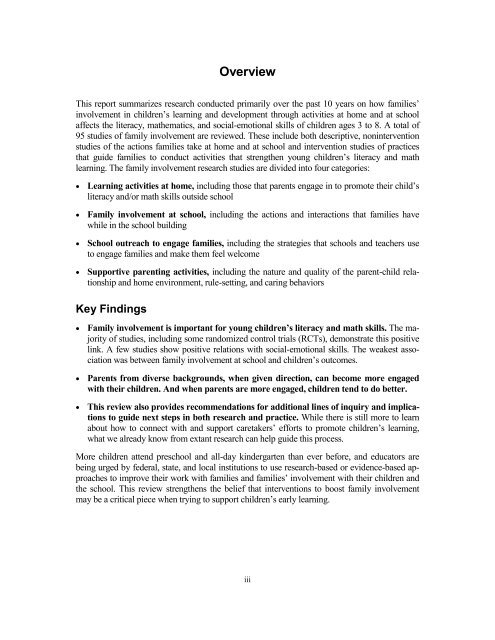u3QtN
u3QtN
u3QtN
Create successful ePaper yourself
Turn your PDF publications into a flip-book with our unique Google optimized e-Paper software.
Overview<br />
This report summarizes research conducted primarily over the past 10 years on how families’<br />
involvement in children’s learning and development through activities at home and at school<br />
affects the literacy, mathematics, and social-emotional skills of children ages 3 to 8. A total of<br />
95 studies of family involvement are reviewed. These include both descriptive, nonintervention<br />
studies of the actions families take at home and at school and intervention studies of practices<br />
that guide families to conduct activities that strengthen young children’s literacy and math<br />
learning. The family involvement research studies are divided into four categories:<br />
• Learning activities at home, including those that parents engage in to promote their child’s<br />
literacy and/or math skills outside school<br />
• Family involvement at school, including the actions and interactions that families have<br />
while in the school building<br />
• School outreach to engage families, including the strategies that schools and teachers use<br />
to engage families and make them feel welcome<br />
• Supportive parenting activities, including the nature and quality of the parent-child relationship<br />
and home environment, rule-setting, and caring behaviors<br />
Key Findings<br />
• Family involvement is important for young children’s literacy and math skills. The majority<br />
of studies, including some randomized control trials (RCTs), demonstrate this positive<br />
link. A few studies show positive relations with social-emotional skills. The weakest association<br />
was between family involvement at school and children’s outcomes.<br />
• Parents from diverse backgrounds, when given direction, can become more engaged<br />
with their children. And when parents are more engaged, children tend to do better.<br />
• This review also provides recommendations for additional lines of inquiry and implications<br />
to guide next steps in both research and practice. While there is still more to learn<br />
about how to connect with and support caretakers’ efforts to promote children’s learning,<br />
what we already know from extant research can help guide this process.<br />
More children attend preschool and all-day kindergarten than ever before, and educators are<br />
being urged by federal, state, and local institutions to use research-based or evidence-based approaches<br />
to improve their work with families and families’ involvement with their children and<br />
the school. This review strengthens the belief that interventions to boost family involvement<br />
may be a critical piece when trying to support children’s early learning.<br />
iii


